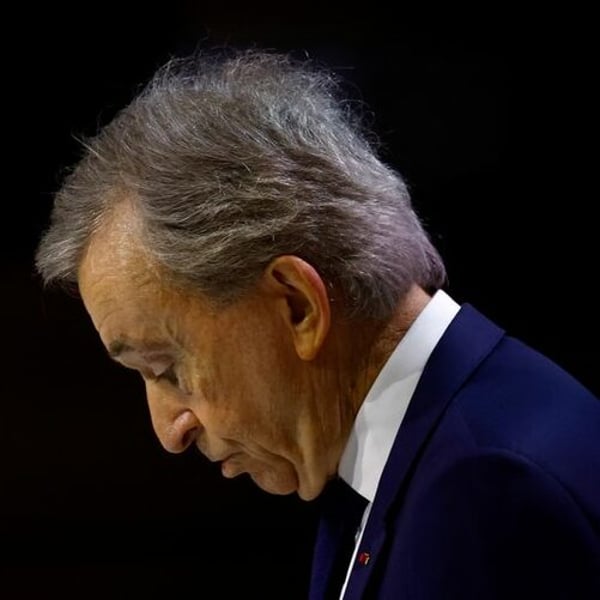By
Bloomberg
Published
December 29, 2024
For France’s biggest billionaires, 2024 was a year to forget as their combined fortunes slumped by a record amount on weak luxury-good demand and political instability.
Bernard Arnault, Françoise Bettencourt Meyers and François Pinault, among the world’s richest, saw about $70 billion erased from their collective wealth this year, according to the Bloomberg Billionaires Index. The industry giants they control — LVMH, L’Oréal SA and Kering SA — are some of the biggest losers on the French stock exchange, with the Gucci owner shedding 41% of its value.
The trio have seen their wealth sucker-punched by a selloff in luxury goods and personal care companies. Chinese shoppers have slowed spending on purchases ranging from leather goods to designer gowns and skincare, while companies including Kering’s Gucci label are grappling with new management and strategy. France’s volatile politics — including the collapse of Michel Barnier’s government this month — have also sapped investor appetite for the country’s assets.
“The Chinese consumer was supposed to be the growth engine of 2024 but that didn’t materialize,” said Ariane Hayate, a fund manager at Edmond de Rothschild Asset Management. “There’s also been luxury fatigue after three years of extraordinary growth as revenge spending faded.”
Sales of luxury goods and cosmetics soared during the pandemic era as consumers splashed out on high-end brands with cash reserves built up during lockdown restrictions. Those dynamics helped propel LVMH founder Arnault to the No. 1 spot on the Bloomberg wealth ranking. He’s now No. 5 and has so far lost more — $31 billion — than anyone else among the 500 richest people in the world. As for L’Oreal heir Bettencourt Meyers, she was long the richest woman in the world and last year became the first woman to have a fortune of $100 billion. She has now lost both crowns.
“For luxury, it’s back to reality, really,” said Kevin Thozet, a member of the investment committee at Carmignac in Paris. “What’s been going on since 2023 is a normalization.”
Pinault, 88, who founded the company that has evolved into Kering, has also seen his fortune take a big hit, falling 64% to $22 billion from an August 2021 high. That’s the largest percentage decline of anyone still on Bloomberg’s wealth index over that period and is largely due to troubles at its biggest fashion label, Gucci.
Pinault’s wealth decline has come while Kering has been under the watch of his son, Francois-Henri Pinault, 62, who focused the empire on luxury from a hodge-podge of retail assets. Yet during his tenure, Kering has remained largely dependent on Gucci, whose success has ebbed and flowed. The Pinault clan holds a 42% stake and 59% of voting rights in Paris-based Kering, whose shares slumped after a string of profit warnings.
It’s been a fall from grace for European luxury shares, which only two years ago were seen as the continent’s growth-stock alternatives to Wall Street’s “Magnificent Seven” cohort of tech megacaps.
Yet the slowdown has not hit all the luxury brands equally. Hermes sales rose through the third quarter due to its product positioning geared toward the wealthiest clients, whose spending tends to be more resilient than less well-heeled customers.
Saxo Banque France’s list of 2024 winners and losers included both Hermes shares, up about 18% year-to-date, and Kering.
Andrea Tueni, head of sales trading at Saxo Banque France, said Hermes’ high margins are backed by the excellence and rarity of their products, while the demand for Gucci’s offerings has dwindled and that recent management changes have not yet borne fruit.
Yet as the year draws to a close, glimmers of optimism are starting to emerge about the broader sector, with investors seeking to position for a potential comeback.
Sales in China are not deteriorating further and they have been reviving in the US, according to HSBC Holdings Plc analysts, who called the third quarter of this year as the bottom.
“To be blunt, we have FOMO,” HSBC analysts including Erwan Rambourg said in a recent note to investors. “We have the conviction that sales in China are not becoming worse and that sales in the US after the election have been improving. These are the two clusters that count.”
Amundi SA just announced the launch of a new exchange traded fund, or ETF, for luxury stocks, citing growth prospects over the long-term including expansion of the middle class in emerging markets, the attractiveness of some brands and increasing demand for high-end products.
The possibility that the worst is over for the sector has spurred a strengthening in some luxury and beauty product stocks since the start of December. The Stoxx 600 Europe 600 Consumer Products and Services Index is up about 5% this month, set for its best performance since February.
“Tech took the upper hand over luxury this year but luxury may make a comeback in the course of 2025,” said Rothschild’s Hayate. “I can envisage a rebound for the sector from the second half of 2025.”







